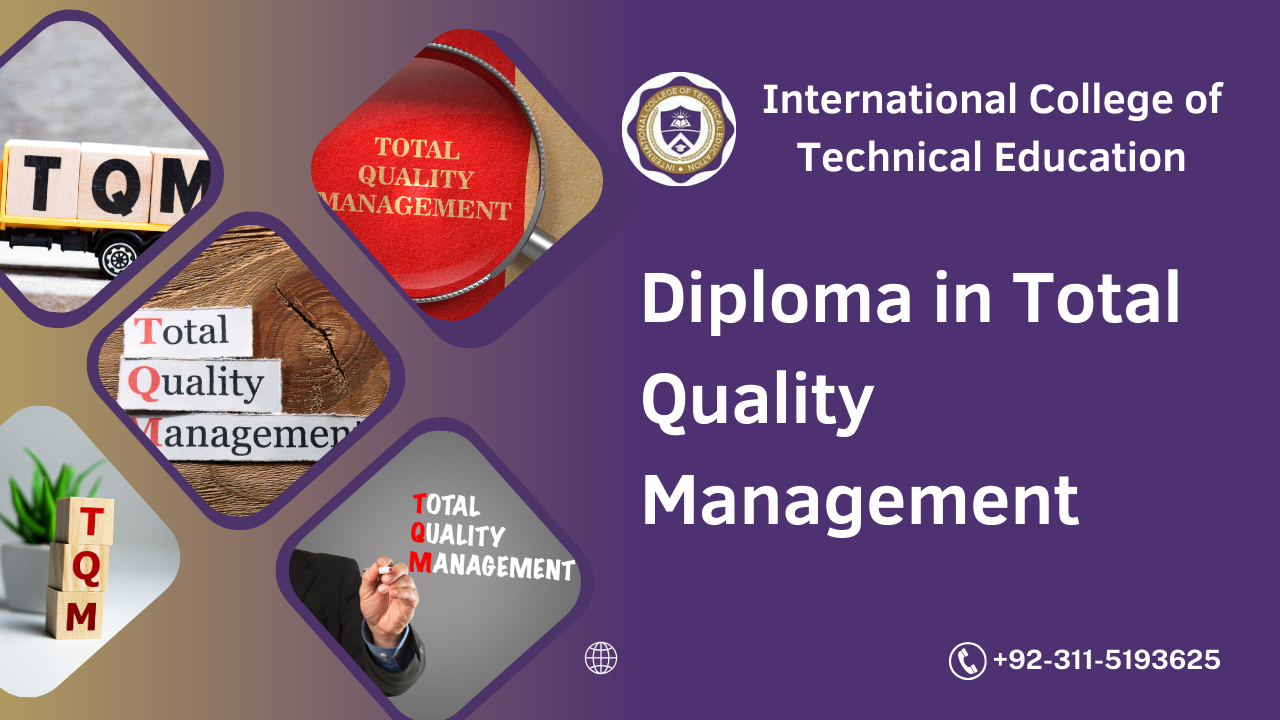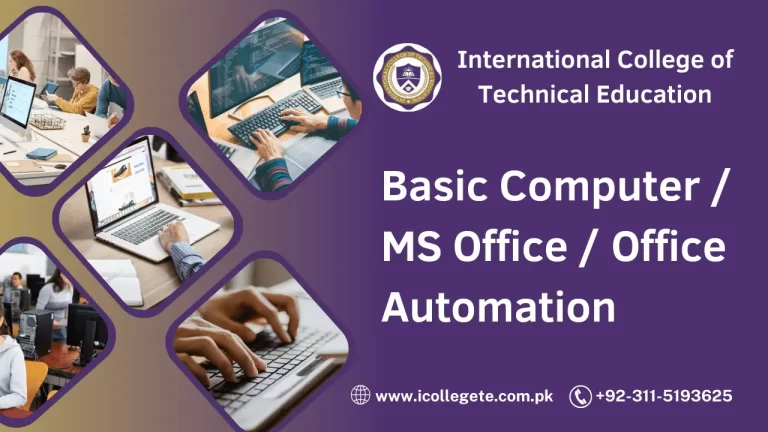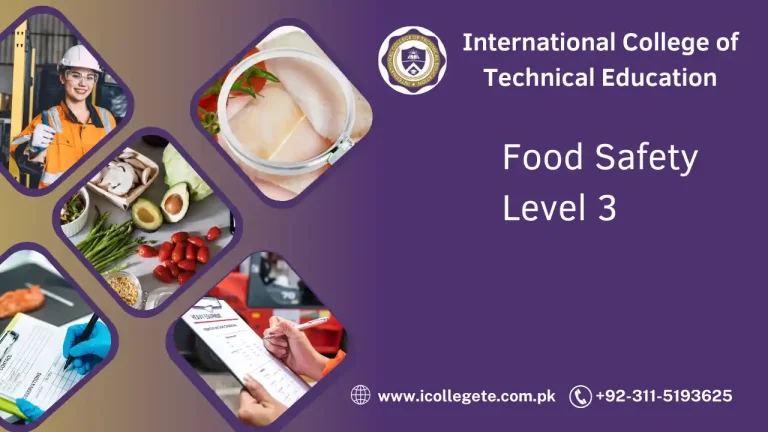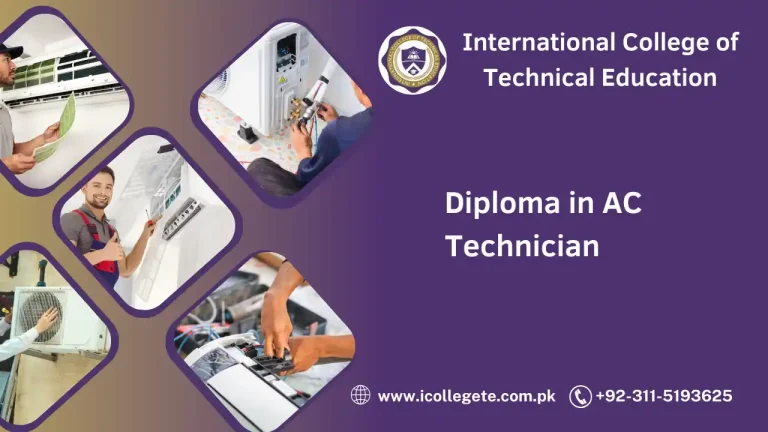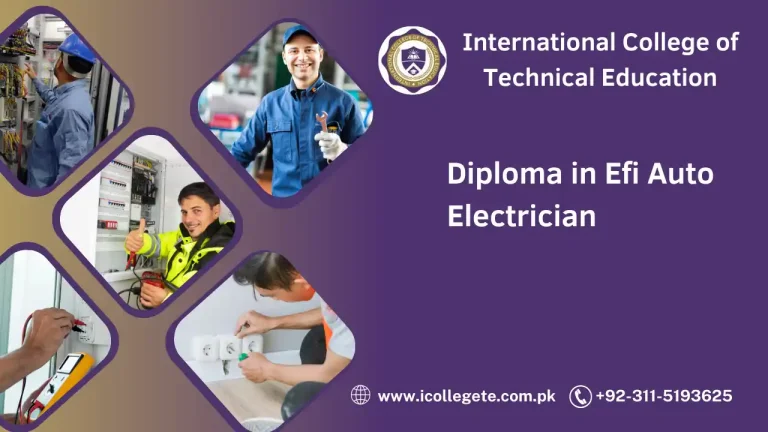In today’s competitive business world, maintaining high standards of quality across all operations is essential for success. The Total Quality Management (TQM) Course in Rawalpindi is designed to provide professionals with the tools, techniques, and knowledge required to implement effective quality management systems within their organizations. TQM is a comprehensive approach to improving organizational performance, focusing on customer satisfaction, continuous improvement, and the involvement of all employees in maintaining high-quality standards.
This course aims to equip you with a deep understanding of how TQM principles can drive efficiency, reduce waste, and enhance customer satisfaction across industries. Whether you’re new to quality management or looking to enhance your existing knowledge, this course will help you develop the skills necessary to implement TQM strategies in a variety of organizational settings.
Course Overview
The Total Quality Management Course in Rawalpindi provides a detailed understanding of the key principles, practices, and tools involved in TQM. From strategic planning and leadership to process control and customer satisfaction, this course covers a wide range of topics that will prepare you to become a leader in quality management. You will gain insights into the philosophies of quality pioneers, such as W. Edwards Deming and Joseph Juran, and learn how to apply their principles in real-world scenarios.
In this course, you will explore the importance of customer-focused quality management, the role of teamwork in quality improvement, and how to measure and monitor the effectiveness of quality initiatives within an organization. It also delves into the integration of quality management with other organizational functions, such as human resources, marketing, and operations.
Learning Outcomes
Upon successful completion of the Total Quality Management Course in Rawalpindi, you will be able to:
- Understand TQM Principles: Gain a deep understanding of the fundamental principles of Total Quality Management, including continuous improvement, customer satisfaction, and employee involvement.
- Apply TQM Tools and Techniques: Learn how to use various TQM tools and techniques, such as the PDCA cycle, Six Sigma, Kaizen, and root cause analysis, to solve quality problems and improve processes.
- Implement Quality Improvement Strategies: Develop the ability to implement quality improvement initiatives within your organization, ensuring better product/service quality and operational efficiency.
- Measure and Monitor Quality: Learn how to measure and monitor quality performance using Key Performance Indicators (KPIs) and other relevant metrics.
- Promote a Culture of Quality: Understand the importance of fostering a culture of quality across all levels of an organization, ensuring that quality is prioritized by everyone, from leadership to frontline employees.
- Ensure Customer Satisfaction: Learn how to assess customer needs and expectations, ensuring that your organization’s products or services meet or exceed them.
- Drive Organizational Change: Acquire the skills to drive change and continuous improvement in your organization, helping it remain competitive in a constantly evolving marketplace.
- Integrate Quality Management Systems: Learn how to integrate TQM principles into existing organizational systems and processes, leading to a more efficient and customer-centric operation.
Study Units
The Total Quality Management Course in Rawalpindi is divided into several key study units that cover various aspects of TQM. These units include:
- Introduction to Total Quality Management: Learn about the history, evolution, and core principles of TQM. Understand why TQM is critical for organizational success and how it aligns with business objectives.
- Leadership and TQM: Study the role of leadership in TQM, focusing on how managers and leaders can foster a culture of quality and guide their teams toward continuous improvement.
- Customer-Focused Quality: Explore customer satisfaction principles, the importance of meeting customer needs, and how to integrate customer feedback into quality improvement processes.
- Continuous Improvement and Innovation: Learn the principles of continuous improvement (Kaizen), how to measure improvements, and how to encourage innovation within your organization.
- TQM Tools and Techniques: Gain practical knowledge of essential TQM tools such as flowcharts, fishbone diagrams, Pareto charts, control charts, and Six Sigma methodology to identify and solve quality issues.
- Employee Involvement and Teamwork: Understand the importance of involving all employees in the quality management process and the role of cross-functional teams in achieving quality goals.
- Process Control and Improvement: Learn how to identify and control processes within your organization to ensure consistent quality and improve efficiency.
- Quality Measurement and Metrics: Study the methods for measuring quality performance, including the use of KPIs and other tools to assess product and service quality.
- Implementing TQM in Organizations: Learn how to develop and implement a TQM plan in your organization, ensuring that quality management systems are integrated effectively into daily operations.
- Case Studies and Real-World Applications: Apply your learning through case studies, role-playing, and real-world examples to understand how TQM works in diverse industries.
Course Benefits
The Total Quality Management Course in Rawalpindi provides numerous advantages for professionals looking to excel in the field of quality management:
- Comprehensive Knowledge: Gain a comprehensive understanding of TQM principles, tools, and strategies, preparing you to handle quality management challenges in any industry.
- Improved Career Opportunities: This certification boosts your career prospects by equipping you with valuable skills that are highly sought after in managerial and quality assurance roles.
- Enhanced Problem-Solving Skills: Learn to use analytical tools and problem-solving techniques to address quality issues and improve organizational performance.
- Increased Organizational Efficiency: By learning to implement TQM strategies, you can drive operational efficiencies, reduce waste, and improve the overall performance of your organization.
- Customer Satisfaction and Loyalty: Learn how to enhance customer satisfaction by focusing on their needs, leading to increased customer loyalty and business success.
- Global Recognition: TQM principles are globally recognized and applicable across industries, making this course beneficial for professionals looking to work in any sector.
- Practical Application: Gain practical, hands-on experience through real-world case studies, which will help you implement TQM in your current or future role.
- Networking Opportunities: Meet professionals from diverse industries, providing you with valuable networking opportunities and insights into best practices in quality management.
- Cost-Effective Quality Improvements: Learn how to reduce costs associated with quality defects and inefficiencies, ultimately boosting your organization’s profitability.
Who is This Course For?
The Total Quality Management Course in Rawalpindi is ideal for a wide range of individuals who are looking to enhance their skills in quality management:
- Quality Managers and Supervisors: Professionals already in quality management roles who wish to deepen their understanding of TQM and improve their leadership in quality initiatives.
- Managers and Team Leaders: Those in managerial or leadership positions who want to implement quality management principles and lead teams toward continuous improvement.
- Business Owners and Entrepreneurs: Entrepreneurs seeking to improve their products, services, and overall business operations through effective quality management strategies.
- Operations and Production Managers: Individuals working in operations or production roles who are looking to optimize processes and ensure consistent product quality.
- Project Managers: Those overseeing projects who want to ensure that quality is maintained throughout the project lifecycle, from planning to execution.
- Students and Graduates in Business or Management: Individuals studying business or management who want to specialize in quality management and increase their employability.
- Customer Service Managers: Professionals focused on customer experience who want to integrate customer satisfaction into the overall quality management framework.
- Consultants and Trainers: Consultants who provide quality management solutions or trainers who want to enhance their teaching expertise in quality-related subjects.
The Total Quality Management Course in Rawalpindi provides essential training for individuals seeking to master the art of quality management. By implementing TQM principles, you can help organizations improve their processes, increase customer satisfaction, and enhance overall operational efficiency. This course will equip you with the tools, techniques, and knowledge needed to drive continuous improvement and foster a culture of quality within any organization.
Whether you’re looking to advance in your career or want to help your organization thrive, the Total Quality Management Course is the perfect starting point. Enroll today and take the first step toward becoming a leader in quality management!

